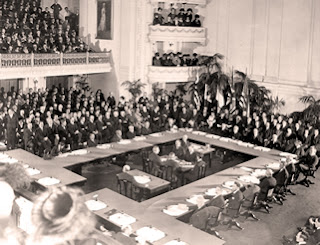Viewing Germany as the chief instigator of the conflict, the
European Allied Powers decided to impose particularly stringent treaty
obligations upon the defeated Germany. The Treaty of Versailles,
presented for German leaders to sign on May 7, 1919, forced Germany to concede
territories to Belgium (Eupen-Malmédy), Czechoslovakia (the Hultschin
district), and Poland (Poznan [German: Posen], West Prussia and Upper Silesia).
The Germans returned Alsace and Lorraine, annexed in 1871 after the
Franco-Prussian War, to France. All German overseas colonies became League of
Nation Mandates, and the city of Danzig (today: Gdansk), with its large
ethnically German population, became a Free City. The treaty demanded demilitarization
and occupation of the Rhineland, and special status for the Saarland under
French control. Plebiscites were to determine the future of areas in northern
Schleswig on the Danish-German frontier and parts of Upper Silesia on the
border with Poland. Perhaps the most humiliating portion of the treaty for
defeated Germany was Article 231, commonly known as the "War Guilt
Clause," which forced the German nation to accept complete responsibility
for initiating World War I. As such Germany was liable for all material
damages, and France's premier Georges Clemenceau particularly insisted on
imposing enormous reparation payments. Aware that Germany would probably not be
able to pay such a towering debt, Clemenceau and the French nevertheless
greatly feared rapid German recovery and the initiation of a new war against
France. Hence, the French sought in the postwar treaty to limit Germany's
potential to regain its economic superiority and to rearm. The German army was
to be limited to 100,000 men, and conscription proscribed; the treaty
restricted the Navy to vessels under 100,000 tons, with a ban on the
acquisition or maintenance of a submarine fleet. Moreover, Germany was
forbidden to maintain an air force. Finally, Germany was required to conduct
war crimes proceedings against the Kaiser and other leaders for waging
aggressive war. The subsequent Leipzig Trials, without the Kaiser or other
significant national leaders in the dock, resulted largely in acquittals and
were widely perceived as a sham, even in Germany. The newly formed German
democratic government saw the Versailles Treaty as a “dictated peace” (Diktat).
Although France, which had suffered more materially than the other parties in
the “Big Four,” had insisted upon harsh terms, the peace treaty did not
ultimately help to settle the international disputes which had initiated World
War I. On the contrary, it tended to hinder inter-European cooperation and make
more fractious the underlying issues which had caused the war in the first
place. The dreadful sacrifices of war and tremendous loss of life, suffered on
all sides, weighed heavily not only upon the losers of the conflict, but also
upon those combatants on the winning side, like Italy, whose postwar spoils
seemed incommensurate with the terrible price each nation had paid in blood and
material goods. For the populations of the defeated powers—Germany, Austria,
Hungary, and Bulgaria—the respective peace treaties appeared an unfair
punishment, and their governments, whether democratic as in Germany or Austria,
or authoritarian, in the case of Hungary and Bulgaria, quickly resorted to
violating the military and financial terms of the accords. Efforts to revise
and defy the more burdensome provisions of the peace became a key element in
their respective foreign policies and proved a destabilizing factor in
international politics. The war guilt clause, its incumbent reparation
payments, and the limitations on the German military were particularly onerous
in the minds of most Germans, and revision of the Versailles Treaty represented
one of the platforms that gave radical right wing parties in Germany, including
Hitler's Nazi Party, such credibility to mainstream voters in the 1920s and
early 1930s. Promises to rearm, to reclaim German territory, particularly in
the East, to remilitarize the Rhineland, and to regain prominence again among
the European and world powers after such a humiliating defeat and peace, stoked
ultranationalist sentiment and helped average voters to overlook the more
radical tenets of Nazi ideology. The burdensome reparations, coupled with a
general inflationary period in Europe in the 1920s, caused spiraling
hyperinflation of the German Reichsmark by 1923. This hyperinflationary
period combined with the effects of the Great Depression (beginning in 1929)
seriously to undermine the stability of the German economy, wiping out the
personal savings of the middle class and spurring massive unemployment. Such
economic chaos did much to increase social unrest, destabilizing the fragile Weimar
Republic. Finally, the efforts of the Western European powers to marginalize
Germany through the Versailles Treaty undermined and isolated German democratic
leaders. Particularly deleterious in connection with the harsh provisions of
Versailles was the rampant conviction among many in the general population that
Germany had been “stabbed in the back” by the “November criminals”—those who
had helped to form the new Weimar government and broker the peace which Germans
had so desperately wanted, but which ended so disastrously in Versailles. Many
Germans forgot that they had applauded the fall of the Kaiser, had initially
welcomed parliamentary democratic reform, and had rejoiced at the armistice.
They recalled only that the German Left—Socialists, Communists and Jews, in
common imagination—had surrendered German honor to an ignominious peace when no
foreign armies had even set foot on German soil. This Dolchstosslegende (stab-in-the-back
legend) helped further to discredit German socialist and liberal circles who
felt most committed to maintain Germany's fragile democratic experiment. The
difficulties imposed by social and economic unrest in the wake of World War I
and its onerous peace terms worked in tandem to undermine pluralistic
democratic solutions in Weimar Germany and to increase public longing for more
authoritarian direction, a kind of leadership which German voters ultimately
and unfortunately found in Adolf Hitler and his National Socialist Party.
 |
| The Armistice Negotiation |

No comments:
Post a Comment